I had been looking for a brass ratchet for a while. How is it possible not to love a brass ratchet?
It is not possible for me I can tell you that.
One day not too long ago, our own Redvise (Brian) sent me a note and said the one he had lost for a long time turned up and did I still want it? Of course I was overjoyed! But I wanted to find something he would want too. Well it turns out he is interested in trying to restore/customize some Perfect Handle tools.
So I want through about a million scraps looking for just the right material to start. But I'll get to that later.
The ratchet arrived and it was beauty. A 1/2"drive, ready to rock.
When they make these, they mostly bead blast off the worst of the casting residue, and call it a day. There is a little grinding cleanup, but its coarse grinding, and just left that way.
Here it is stripped, but as issued.
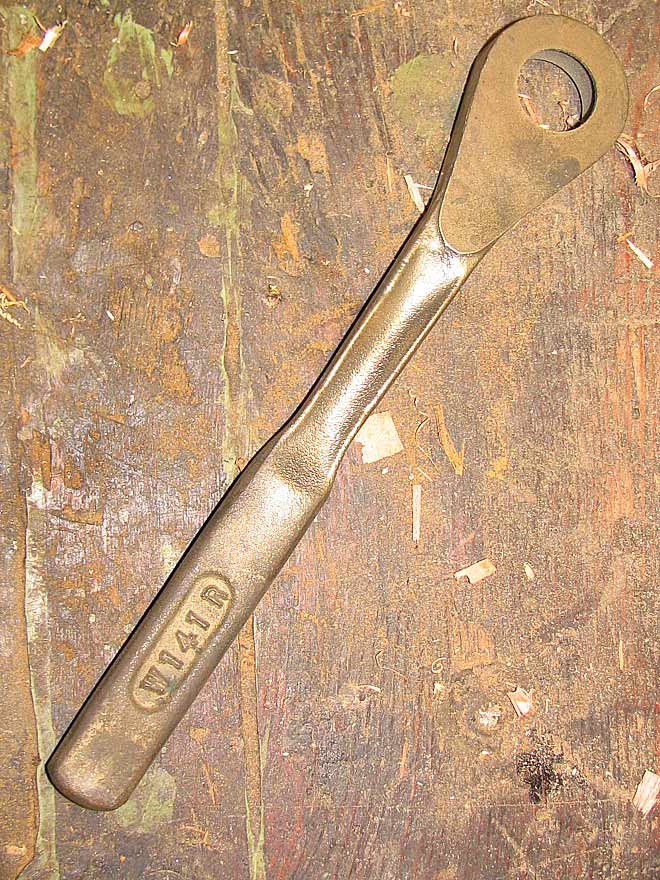
There were ratchets and other tools made of solid beryllium copper in times past. These you can't do much with. Beryllium is poison if you grind it. The tool is fine but the dust can be very bad, they say.
But most "safety tools" you see now are made of aluminum/bronze, for the past 50 years.
Al/br is pretty safe to work. This ratchet proudly had the al/br marking.
The drive plug looked a little coppery though. Beryllium suspect.
So I wouldn't touch that, with a 10 foot pole!
The concave "neck" portion was going to be the hardest to polish. I started with a dome shaped coarse grinding wheel. The kind they sell in the auto parts houses mounted on 1/4" shafts for porting heads and such. Since this was essentially brass I just used a drill motor to turn it. I will sometimes use a Roto-zip motor if I need more speed.
A few deep passes hard cutting passes on each side, and I had most all the casting scale off the neck.
Then I needed to rough polish/shape it. The Klingspor company makes these delightful flexible sanding mops. They will flop into odd shapes and sand them smooth. But I can't afford them. So I make my own out of belt sander belts. Rip up strips of belt and run a 1/4" arbor though.
They aren't quite as flexible and don't last as long, but they are cheap, and they work, so what can you do?
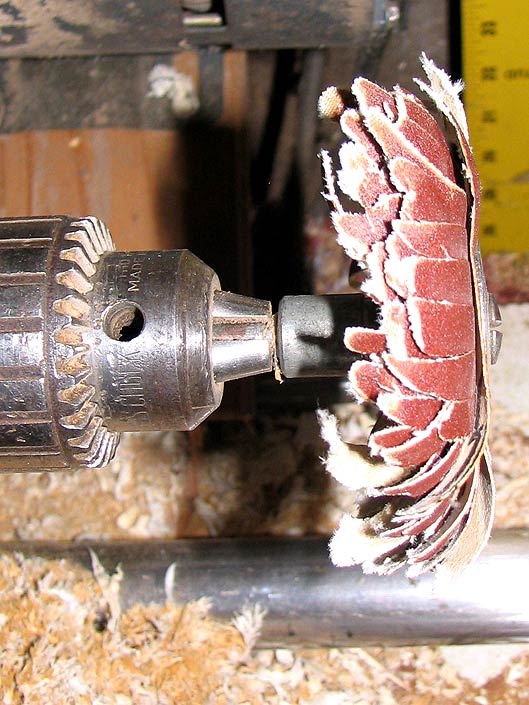
This got me the neck roughed out well.
Next was all the rest of the flatter portions.
I use small flexible rubber disk pads for a lot of stuff. They were the first thing I started with (look for them at yard sales) and have served me well. Finding 5" sandpaper disks, whether glued or bolted, is really easy. The flexible rubber will get you into all manner of places.
Its coarse then fine for all the flat(ish) parts.
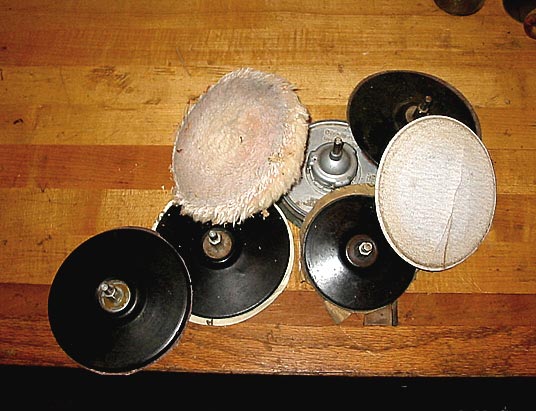
At 180 grit, you start getting a pretty high shine. :) Metal has a grain just like wood does. Grinding in one direction cuts more material, but the finish is not so pretty. In another direction, same pad same abrasive, you quit cutting much and start getting polish instead. Every piece of work is different. I can't guess beforehand which direction is which, but it always happens.
So I just try it one way and if that isn't what I wanted, I turn the work around in the vise, or walk myself over and try another direction.
I was using my old Record woodworkers bench vise for this, if I haven't mentioned yet. For this work I want my project held securely in non marring jaws. I want it below waist high so I can get myself over top of it.
Sure there are other tools that cut metal faster. But I am looking for finish here.
Fast is for another time. I want steady control.
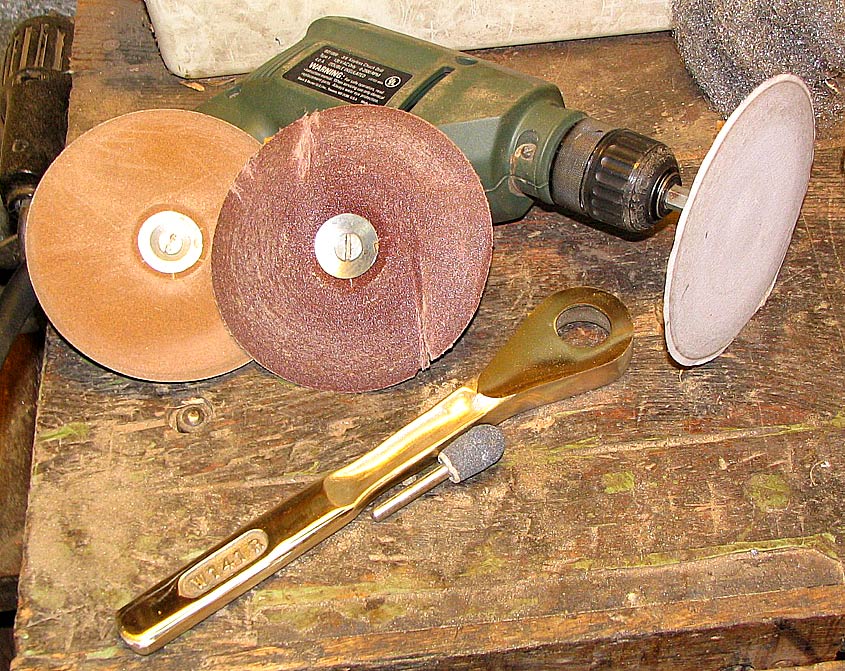
When I was satisfied with the sanding I went to the buffing wheels. I have a hard sewed wheel mounted in a cheap pedestal grinder. This spins very fast. Regular 3600 grinder speed. This is good for cutting away material for a foundation polish. I use coarse polish with it. The trick with this, is to apply the bar of polish as the grinder is spinning up. At full speed nothing will stick to the buff, so you catch it while its still spinning slow. Then it deposits just fine.
Cut the work until its even.
Buffing is something you mostly do with a medium pressure. When you find yourself pressing the work hard against the wheel you are doing something wrong. Go back to a coarser cutting wheel, or use more polish on the wheel you are at. The softest materials only need a baby kiss touch.
On every piece of work facing the wheel, imagine a line directly across the center. This is the horizon line. You can buff below the horizon all you want. Its perfectly safe whatever you do. But going above the horizon is from scary to suicidal. If you accidentally get too high above the horizon its likely to pull the work from your hands and throw it right back at your forehead with a high velocity. Or throw it anywhere else with the speed of a gunshot. Even if you aren't injured, your work will likely be damaged or totally ruined. Or if it is a small part you will never even see it again! Gone gone gone.
So just buff below the horizon, flip the work upside down, and buff below the horizon once again. This is how you do it safely.
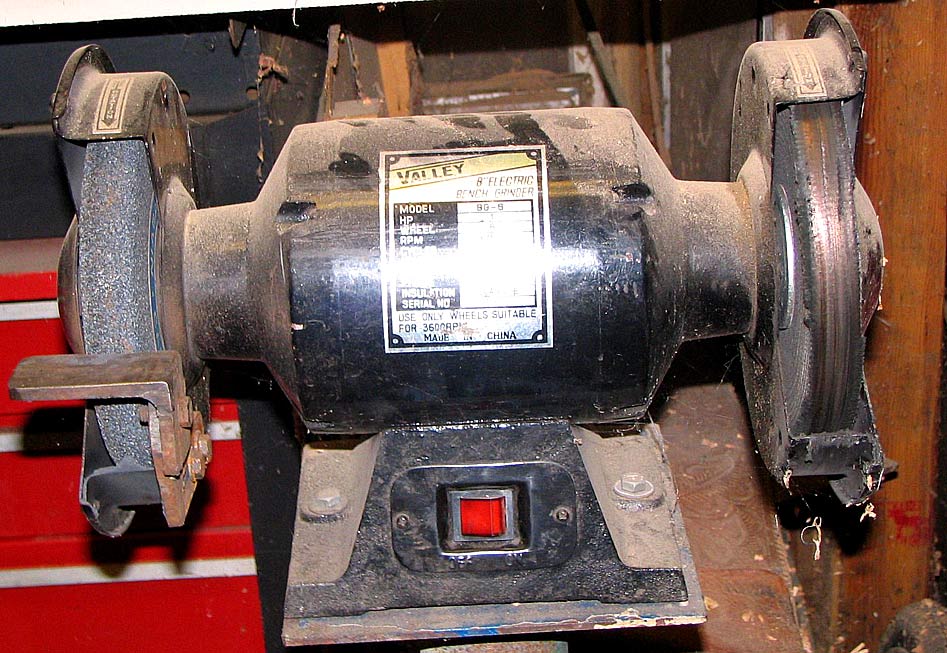
Next I go to softer sewed cotton or flannel. Looser sewed cotton final polishes all hard materials, and the loose flannel is for final polish of the softest. I will polish wood, plastic, aluminum and other soft metals on the flannel.
Here is a standard buffing head. Everyone should have one. There are thousands available. They take 8" wheels. For final buffing you do not want fast speed! You will never do good work at fast speed. If you look close (lousy picture I know) you can see the motor has a 1 1/4" pulley on it. This is the smallest pulley made. The arbor has a 2" pulley on it because this is the largest that will fit the frame. The motor is a 1725rpm motor, so if you do the math you find you are buffing at roughly 1000rpm. This is --one third-- the speed of a standard grinder.
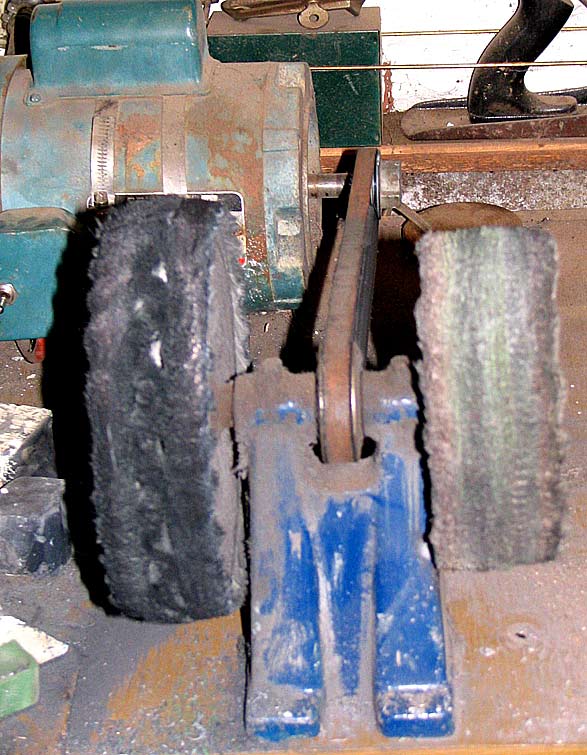
Looking to the left in the picture you can see some colored blocks. This is polish. It comes in bars, or sometimes bricks! There is coarse, medium and fine aluminum oxide. White rouge, red rouge, tripoli, chrome rouge, lots more. Even when the name is supposed to represent something, different manufacturers use different formulas so you just have to try it and decide what is working for you, yourself. My best advise is to buy the large bricks, as these were made for professional shops. Even still you will find some you love and some you like less.
They say to never use different polishes on the same buff. But I don't find this to be very true. You have to keep applying polish every few minutes as you work anyway. Both the polish, and a micro surface layer of the buff wears away as you work. So you don't have much polish left when you are through anyway.
For the every finest buffing of precious metals, and the application of wax so hard it can only be applied with a buff, I use a small grinder. Yes, its back to fast speed for this.
Gold and silver only need the finest polish and the lightest touch, on the loosest softest flannel.
You don't want to be cutting up your gold!
Pure carnuba wax is hard as a rock. It comes in small cakes. (that is part of one on the left) Apply it to the buff while the buff is spinning up, of course, and apply it with alight touch to finished work, for a --brilliant-- mirror shine like no other.
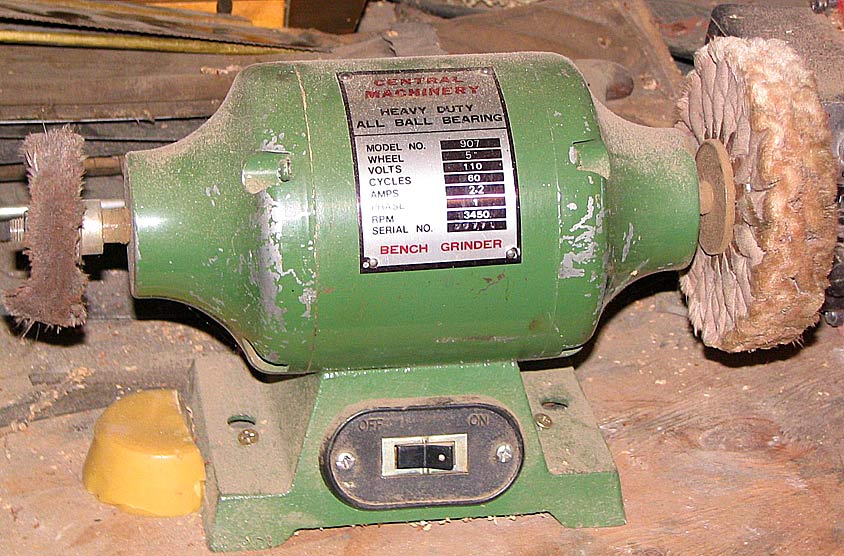
Dig it, brass ratchet
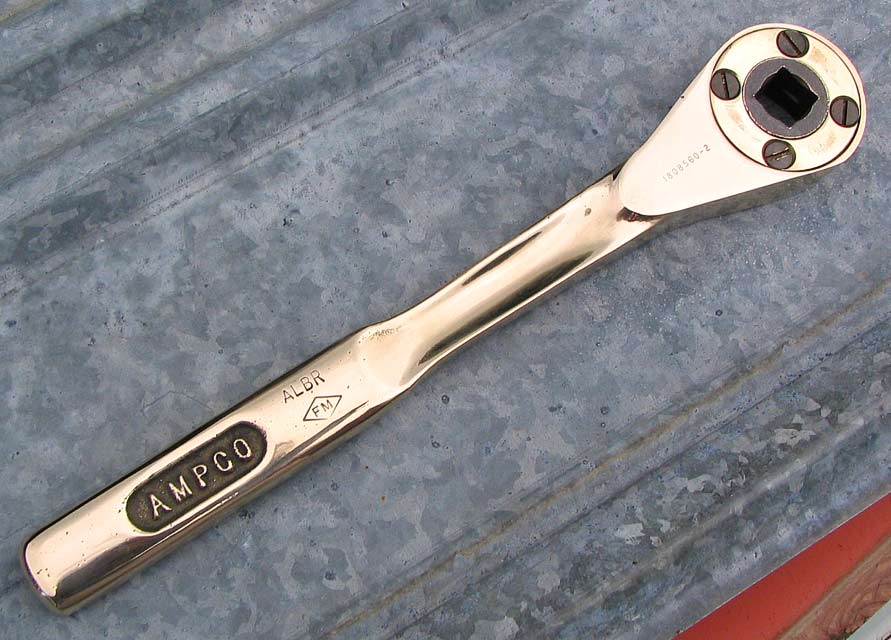
yours Scott